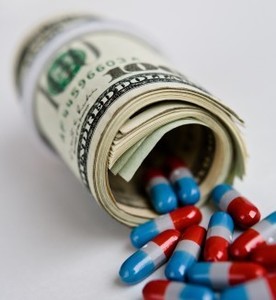Biological drugs remain unaffordable for many in the US due to strategies used by pharmaceutical companies and negative messaging about biosimilars, explains a recent commentary by Dr Joel Lexchin, School of Health Policy and Management at York University, Canada [1].
How to make biological drugs more affordable
Biosimilars/Research
|
Posted 08/05/2020
 0
Post your comment
0
Post your comment

Biological drugs are some of the most expensive medications, particularly in the US. Despite accounting for just 2% of prescriptions written in the country, they are responsible for 37% of net drug spending (US$120 billion in total).
As a result of high costs, almost a quarter of low-income patients in the US have not adhered to their prescribed treatments, according to 2014 data.
A commentary recently published in JAMA Network [1] discusses the reasons for these high prices, and what can be done to make biological drugs more affordable.
Research and development (R & D) costs are often cited as a reason for the high cost of biological drugs, however, Dr Lexchin explains that they are not sufficiently high to justify the costs to consumers. Although R & D costs are higher than for small molecule drugs, the difference is US$391 million vs US$309 million, and does not match the difference in market costs.
The author gives the example of first-generation treatments for multiple sclerosis, which entered the US market in the 1990s at annual costs of between US$8 and US$11 thousand per year. By 2013, the price had increased to US$60 thousand per year, and newer products were introduced at even higher prices (25%–60% more than the existing products).
Interviews with leaders in biological development have since revealed that the reason for such price increases was not development costs, but revenue maximization and corporate growth.
The article also explains that drug companies generally spend more on dividends and share buybacks than they do on R & D. In 2015, of the top 100 pharmaceutical companies, 64 spent twice as much on their marketing and sales as on R & D.
Moving on to discuss biosimilars, the article explains that market penetration is generally low in the US. At the end of 2019, only 11 of 26 approved biosimilars [2] were marketed in the US. By contrast, in Europe, 39 of 58 approved biosimilars [3] had been launched by May 2018. Biosimilars also have good market share in Europe.
Part of the reason biosimilars have been less successful in the US is the message from pharmaceutical companies, and others, that it can be dangerous to switch to a biosimilar drug, the author says. The article references a recent systematic review [4] which showed that switching is not associated with an increased risk of safety concerns or reduced efficacy.
There is also a trend for companies to employ nurses to help patients to use brand- name medications, which is generally not available for an equivalent biosimilar, and disincentivizes their use.
To close, the author provides three recommendations to improve the situation in the US and make biologicals affordable for all:
1) Medicare should negotiate directly with drug companies.
2) Substitutions with biosimilars should be made mandatory, as has taken place in several Canadian provinces [5].
3) Pharmaceutical companies should publicly justify their claimed R & D expenses.
Conflict of interest
The author of the research paper [1] reports receiving payment for participating on a panel at the American Diabetes Association, and other events. The full disclosure can be read in the research paper [1].
Editor’s comment
Readers interested to learn more about biosimilars are invited to visit www.gabi-journal.net to view the following manuscripts published in GaBI Journal:
Top developments in biosimilars during 2019
USA and Europe differ in interchangeability of biosimilars
Interchangeability of biosimilars in the US and around the world
Readers interested in contributing a research or perspective paper to GaBI Journal – an independent, peer reviewed academic journal – please send us your submission here.
Related article
Biosimilars could have saved US companies US$1.4 billion in 2018
References
1. Lexchin J. Affordable Biologics for all. JAMA Netw Open. 2020;3(4):e204753.
2. GaBI Online - Generics and Biosimilars Initiative. Biosimilars approved in the US [www.gabionline.net]. Mol, Belgium: Pro Pharma Communications International; [cited 2020 May 8]. Available from: www.gabionline.net/Biosimilars/General/Biosimilars-approved-in-the-US
3. GaBI Online - Generics and Biosimilars Initiative. Biosimilars approved in Europe [www.gabionline.net]. Mol, Belgium: Pro Pharma Communications International; [cited 2020 May 8]. Available from: www.gabionline.net/Biosimilars/General/Biosimilars-approved-in-Europe
4. Cohen HP, Blauvelt A, Rifkin RM, et al. Switching reference medicines to biosimilars: a systematic literature review of clinical outcomes. Drugs. 2018;78(4):
5. GaBI Online - Generics and Biosimilars Initiative. Ontario becomes third Canadian province to switch patients to biosimilars [www.gabionline.net]. Mol, Belgium: Pro Pharma Communications International; [cited 2020 May 8]. Available from: www.gabionline.net/Biosimilars/General/Ontario-becomes-third-Canadian-province-to-switch-patients-to-biosimilars
Permission granted to reproduce for personal and non-commercial use only. All other reproduction, copy or reprinting of all or part of any ‘Content’ found on this website is strictly prohibited without the prior consent of the publisher. Contact the publisher to obtain permission before redistributing.
Copyright – Unless otherwise stated all contents of this website are © 2020 Pro Pharma Communications International. All Rights Reserved.
News
FDA approves Poherdy (first interchangeable pertuzumab) and Armlupeg (pegfilgrastim) biosimilars
EMA recommends approval for insulin glargine biosimilar Ondibta and denosumab biosimilar Osqay
General
Samsung Bioepis wins Pyzchiva case; Regeneron patent rulings threaten foreign biosimilars
Chinese biosimilars go global: growth, partnerships, and challenges
What is the future for the US biosimilar interchangeability designation

Biosimilars/Research Posted 05/06/2025
Biosimilar clinical efficacy studies: are they still necessary?

Biosimilars/Research Posted 27/05/2025
The best selling biotechnology drugs of 2008: the next biosimilars targets








Post your comment